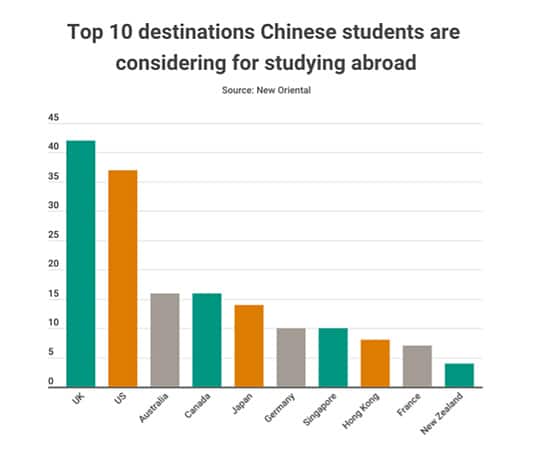The UK has taken over the US, as the top destination for overseas study for Chinese undergraduate and postgraduate students.

While undergraduate applicants from the EU decreased by 40% in 2021, applicants from China increased by 21% despite the covid impacts.
Students from China provide about a fifth of tuition fees, which are worth about £1.3 billion ($1.79bn) every year.
Yet, when I talk to UK universities, there seems to be winners and losers.
The winners, have met their quota of Chinese students this academic year. The losers, have fallen significantly short.
So, surely, the opportunity is so great, universities should all be in the winning category?
Not so, and here is why;
1. Outdated narrative
Todays Gen Z student is digital savvy, spoilt by china digital innovation, well researched and will only engage with authentic content. I have seen many universities repeat the same content for 3 years running! It simply won’t work!
Creating content that demonstrates the universities unique personality, is critical. As is, engaging with current students and allowing them to be the voice of some of your narrative.

2. Apathy
Doing things the way you always have, will no longer work.
We are increasingly leveraging platforms like BiliBili, Little Red Book, WeChat video channel and Douyin as well as curating content with influencers. Only having a presence on WeChat and Weibo, without a reason for students to interact, will no longer work.
3. Competitive advantage
Universities often base marketing decisions on assumptions. Assumption as to where they sit in terms of positioning, or assumptions as to why students will apply. Getting objective advise from a 3rd party, to decipher your competitive advantage, is critical. Only then, will your narrative come across as authentic and more importantly, result in applications.
4. Content
Just localizing your UK content from Facebook and Instagram, will demonstrate that you are not committed to this market. At best, it will simply not resonate, at worse, it may be completely insensitive and irrelevant.
Chinese GenZ students are different to their European counterparts, and the platforms they engage with are different also. To that end, content should be tailored for this market, and given the necessary resource to deliver authentic, innovative and resonating narrative.
5. Conversions
Applications do not necessarily lead to conversions. Typically, Chinese students will have in excess of 5 offers. You therefore have to put adequate effort into converting offer holders.
Retargeting campaigns, setting up WeChat groups, creating relevant messaging and running conversion webinars are just a few ways we convert offer holders for our university clients.

At Emerging Comms, we have been working with dozens of universities over the last 7 years. Without exception all have improved their Chinese student quota, even with the same budget!
No one university is the same. They are all unique, as is the plan to support their growth.
Wondering how your university is ranked among all UK universities in social media performance? Please get in touch [email protected]
If you would like to talk to one of our education specialists about how we might be able to help you, please get in touch
You might also find these resources useful
